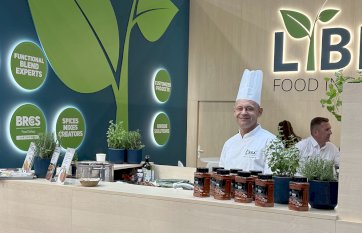An interview with Luiz Fernando Guidorizzi de Carvalho, Sales Director – Latin America
Could you Introduce yourself, some sentences about you, your experience, about fiber, etc?
I have been working for Interfiber during the last 5 years. Before, I had 15 years experience in food industry, working with soluble and insoluble fibers. So, 20 years of experience in the fiber business, covering Brazil, Latin America, and now, also responsible for Canada.
I started in Interfiber in 2018 to organize the distribution network in Brazil, Latin America and Canada. I helped a little bit in US, due to my deep knowledge in different markets and applications. I’m also in constant contact with our sales representative team in Asia and Europe, exchanging market and customers ’experiences with our products.
What can you tell us about your market? What do the customers look for on your market the most often?
The business in Latin America is doing pretty fine. There is a huge demand for fibers and, after the pandemic, consumer are looking for fibers, for healthier foods and for lower calorie products. Consumers are also looking for cost reduction, mainly because of the economic crisis after COVID, that is very critical in Latin America. So, as our fibers help to reduce the costs and improve the nutritional values, they fit perfectly with the current demand of the market.
The meat industry in Latin America has a lot in common with the European culture. There are many European communities in the region, like Spanish, Portuguese, English, German, Polish, Italian and French. So there is a big mix of cultures from everywhere, including the native Indians and African communities. The meat industry is very strong, especially in places, where we have German and Polish influences. Known as “meat countries”, Polish and German meat products are preferential on the market worldwide.
We sell our fibers especially to ham, to fresh meat, fresh poultry, fresh chicken, burgers, sausages and all kind of meat products The fibers help to reduce the costs, by adding fiber plus water in the products. At the same time, fibers improve the texture and the juiciness of the products, what is desired, especially in low cost formulations.
In bakery industry, the producers use fibers mainly for nutritional facts, to improve the nutritional values. In Interfiber, as we came from the meat industry, we need to teach the market to use the fiber as a technical ingredient also in bakery. How to improve the resistance in cookies and crackers, how to improve freshness and resilience in breads and cakes. Those are challenges that can be solved by adding insoluble fibers in the formulations.
We also work also with other kind of applications, like shredded cheese as anticaking agent replacing silicone dioxide and microcrystalline cellulose. We are selling a lot to bake stable fillings. And to the sauce business, replacing pulp by fiber and water to reduce the costs and keep the sensorial properties.
To sum up, in all the application we use our insoluble fibers, we are improving the nutritional facts and also bringing technology to the product.
What products are you currently working on?
At the moment, in Latin America, I’m very focused on cocoa fiber. Also, citrus fiber, in my opinion is a very interesting product, especially to replace with a clen label. Another product with great potential is our Unifit E-MAX, egg-replacer, that allows to remove eggs from the recipe for some bakery products, and reduce production costs.
Of course, fibers are also on top priority, especially with our wide portfolio range of sources and sizes.
Thank you very much for the interview. We wish you further growth and success!




